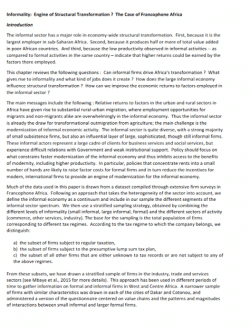
Policy highlights:
- In low-income countries, 70% of all workers work in the informal sector. Both wages and labour productivity are said to be lower in informal businesses. The authors of this paper, however, found that the difference in productivity is located primarily between small and large informal firms, instead of between formal and informal firms. They argue that lower productivity is mainly caused by constraints related to the informal status of businesses. Larger firms are able to manage these constraints.
- An important reason many businesses in Francophone Africa have informal elements is that formality is costly; most formal business is done by large multinationals that receive protection and exemptions from rent and/or tax and rules. Costs are also higher for formal firms when it comes to infrastructure, financial capital and labour.
- Because informality often only refers to part of a business, formality should be seen as ranging on a scale from more informal to more formal, instead of as a dichotomy. The level of formality should be based on size of activity, mobility of the workplace, registration, taxation and sincerity of accounts.
- The authors of this study argue that structural transformation in Africa should be focused on moving labour to the informal sector. The service and manufacturing sectors will not be able to absorb the surplus of labour from agriculture and, at this point, access to the formal sector is difficult and costly.
- Policymakers should focus on the following: 1) supporting large informal businesses that have enough capacity to become formal, and their ability to enter into the formal market; 2) helping small informal businesses move up the formality scale gradually, enabling them to develop capacity without being restricted to a formal-informal dichotomy and being denied access to public services and finance; and finally, 3) re-examining the structure of protected rent and wages to incentivise productivity growth.










